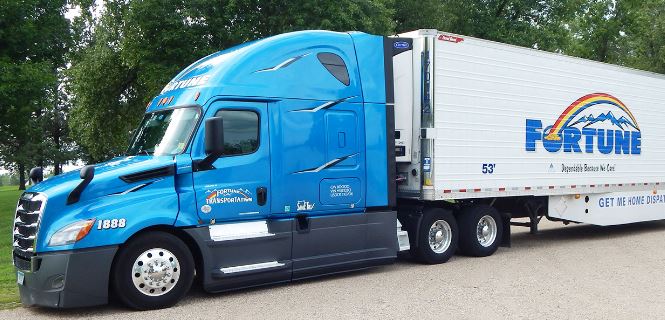Fortune Transportation’s Embrace of Cloud Tech Begins with Cleo
Leading mid-size trucking business leverages Cleo Integration Cloud in hybrid deployment to open legacy B2B systems to modern IT environment
Founded in 1980 in Windom, Minnesota, Fortune Transportation is a mid-size trucking company, a family-owned business serving the refrigerated freight needs of customers throughout the Midwestern United States.
As is true for so many companies, the pandemic has been challenging for Fortune, but they’ve ultimately benefited from it. For instance, as shelter-in-place orders took hold, Fortune found itself delivering more and more truckloads of what IT Director Philip Symens calls “the good stuff” – beer, cheese, pizza, ice cream and the like. And even as the pandemic has waned, let’s just say Fortune’s been delivering a lot more food & beverage products, and growing fast.
With upwards of 150 trucks, 250 trailers, and 10 vans making up the Fortune fleet, most of it for refrigerated shipping of high demand consumer goods, business has been steadily growing.
Serving customers in 18 bread-basket states from its hubs in Minnesota, Colorado, and New Mexico, Fortune has an efficient, two-person IT staff, with minimal outsourced aspects and most of its solutions running on-premises. Yet while cost effective to keep its technology in-house, this situation sometimes makes it challenging to stay ahead of ever-changing customer expectations while also ambitiously managing rapid growth.
Fortune is not alone in facing these sorts of challenges. According to a recent survey of integration experts, 87% of Logistics companies are yet to move their integration technology to the cloud. The good news is that increasing numbers of them are focusing forward, with over half (51%) saying they’re increasing budgets for technology upgrades. This targeted spend is expected to be allocated for improving governance, automation, integration, and business intelligence. Still, logistics and transportation firms in general have a long way to go to achieve faster systems that produce fewer errors, reduce cost, and increase customer satisfaction.
To keep pace in an industry undergoing digital transformation, and to serve its ever-changing ecosystem of customers, partners and suppliers, Fortune knew it would need to adopt cloud technology sooner rather than later. So, they elected to begin by taking a hybrid approach, beginning with a strategic aspect of their ecosystem environment – integration technology.
Fortune runs its digital ecosystem using Microsoft Windows Server, an enterprise-class server operating system yet one that is used for on-premises data storage, applications, and local networks. The company also employs a Transportation Management System (TMS) from Trimble and had been using Cleo’s on-premises data transformation solution (Cleo LexiCom®) for many years with great stability and high performance.
So, why make a change?
In 2021, Cleo rolled out its new Cleo Integration Cloud (CIC) Express package, which is specifically designed to help customers take their first step into the cloud by migrating connectivity and data movement capabilities. CIC Express includes AS/2, SFTP, FTP(s), Email and Partner Mailbox capabilities on a single platform to rapidly onboard and transact with ecosystem trading partners, like shippers and retailers.
The release of CIC Express prompted Fortune to entertain managing its trading partner connections via the cloud because Symens had already acknowledged Fortune needed to begin exploring cloud-based solutions to increase speed, improve visibility, provide security, and reduce overall costs. At the same time, Symens was not ready to put Fortune’s long-standing on-premises investment out to pasture.
The solution? A hybrid approach, where trading partner connectivity and data movement are shifted to the cloud using the Cleo Integration Cloud, but data transformation remains an on-premises task in their existing infrastructure.
“What’s super-cool is that the flexibility of Cleo’s platform makes this even possible for us,” Symens said. “Even though most of our IT environment remains on-prem, we believe cloud is the way of the future. CIC marks our first foray into this realm, and it’s already quite promising. We like the fact that it doesn’t take up another server, plus we don’t have to worry about updating any software or operating systems. I just need to make sure we have our connection to the Internet. That’s peace of mind, and that makes it all worth it,” Symens said.
“We’re working on moving all our trading partners to the cloud using CIC and expecting to gain greater visibility and control from that level, but not losing any of the value of our prior IT investment. It’s a ‘best of both worlds’ scenario,” Symens concluded.
Having a hybrid environment and continuing to generate ROI of out of their on-premises investment were critical factors in choosing to migrate their ecosystem connections to the cloud. But, when Symens was asked what eventually sold him, he replied “the cyber security protection and robustness of CIC. There are new exploits every day, and now that is just one less thing I have to worry about.”
Category: Connected Fleet News, Featured, General Update, News, Safety, Tech Talk










